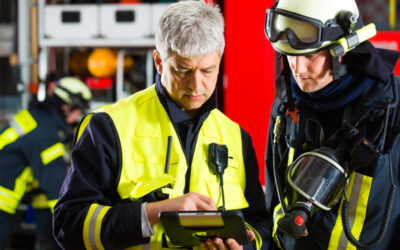Volunteer firefighters play a crucial role in ensuring the safety and well-being of their communities. They dedicate their time and effort to protect lives and property, often facing dangerous situations. However, when these brave individuals get injured or fall ill while on duty, questions arise about their eligibility for workers’ compensation benefits. In fact, they are eligible for workers’ comp benefits. The eligibility is determined based on a comprehensive medical chart review to help establish the injury or illness.
Managed Outsource Solutions (MOS) provides dedicated medical chart review services for workers’ comp attorneys.
Workers’ Comp for Volunteer Firefighters & the Significance of Medical Record Review
The eligibility for workers’ compensation benefits typically hinges on the employment status of the individual. In most cases, employees receive these benefits as part of their compensation package. However, volunteer firefighters are not traditional employees; they voluntarily serve their communities without monetary compensation. So, do they have any recourse if they are injured or become ill while on duty? The answer is yes, and it varies depending on the jurisdiction.
State-specific Regulations
Workers’ compensation laws and regulations vary from state to state in the United States. Some states have specific provisions that extend workers’ compensation benefits to volunteer firefighters, while others do not. In states that do provide coverage, volunteer firefighters are generally eligible for workers’ compensation benefits just like paid firefighters or other employees.
Volunteer Firefighter Benefit Laws
Several states have enacted Volunteer Firefighter Benefit Laws that explicitly outline the eligibility and benefits for volunteer firefighters who sustain injuries or illnesses while on duty. These laws are designed to recognize the valuable service provided by volunteer firefighters and ensure they receive the necessary support when injured.
Medical Necessity Review and Workers’ Compensation
When a volunteer firefighter seeks workers’ compensation benefits, the process involves a medical necessity review. This step is crucial in determining whether the treatments provided were appropriate, justified, and directly related to the injury or illness sustained while on duty.
The review focuses on several key aspects:
- Causation: Establishing whether the injury or illness was work-related.
- Treatment Appropriateness: Evaluating whether the prescribed medical interventions, such as surgeries, therapies, or medications—align with accepted standards of care.
- Cost Efficiency: Ensuring that treatments are not only necessary but also cost-effective.
- Return-to-Work Readiness: Assessing the firefighter’s recovery progress and ability to resume duties safely.
Medical necessity reviews rely on thorough examination of medical records, diagnostic reports, and treatment histories. The findings are instrumental in validating claims, supporting fair benefit decisions, and ensuring that volunteer firefighters receive the care and compensation they deserve.
Medical Chart Review
Medical record review is an integral part of the workers’ compensation process. It involves the thorough examination of medical records and documents related to the firefighter’s injury or illness. This review helps insurance companies and workers’ compensation boards assess the validity of the claim and ensure that the injury is work-related.
Several key elements are closely examined:
- Initial Assessment: The review begins by examining the initial medical assessment made by the treating physician. This includes details of the firefighter’s condition at the time of the injury or illness and any immediate medical interventions undertaken.
- Diagnostic Tests: The medical chart is scrutinized for diagnostic tests such as X-rays, MRIs, CT scans, or laboratory tests that were conducted to diagnose the injury or illness accurately. The results of these tests help establish the severity and nature of the condition.
- Treatment History: The complete treatment history is reviewed, documenting all medical interventions, surgeries, medications prescribed, and rehabilitative therapies administered to the firefighter.
- Progression of Condition: The chart review tracks the progression of the firefighter’s condition over time. This includes noting any improvements, setbacks, or complications that may have occurred during the course of treatment.
- Physician Notes: The detailed notes made by treating physicians at each visit are examined to understand the firefighter’s symptoms, response to treatment, and overall prognosis. These notes provide valuable insights into the patient’s condition and the effectiveness of the prescribed treatments.
Medical Case Chronology
A medical case chronology is prepared to establish a clear timeline of events and medical treatment,. This document outlines the sequence of medical treatments, diagnostic tests, and any rehabilitation efforts. A well-documented chronology is essential for a successful workers’ compensation claim. It serves as a valuable reference for all parties involved in the workers’ compensation process, including insurance companies, attorneys, medical experts, and administrative bodies.
Here’s how a medical case chronology is developed:
- Initial Incident: The chronology starts with a detailed description of the initial incident or event that led to the firefighter’s injury or illness. This includes the date, time, location, and circumstances surrounding the incident.
- Medical Evaluation: It then outlines the firefighter’s immediate medical evaluation and any first-aid or emergency medical treatments received at the scene of the incident.
- Medical Treatment: The chronology continues by documenting every medical treatment, procedure, or surgery the firefighter undergoes, specifying dates and locations. It includes information on consultations with specialists, diagnostic tests, and prescribed medications.
- Rehabilitation: If applicable, the chronology includes details about the rehabilitation or physical therapy sessions the firefighter participates in.
- Progress and Complications: It tracks the firefighter’s condition over time, noting any improvements, setbacks, or complications that arise during the treatment and recovery process.
- Physician Opinions: The document incorporates the opinions and assessments of treating physicians and specialists regarding the firefighter’s condition, prognosis, and ability to return to work.
- Workers’ Compensation Filings: The chronology includes key milestones in the workers’ compensation claim process, such as the date the claim was filed, any hearings or appeals, and the final resolution of the claim.
- Medical Necessity Review Findings: The chronology integrates conclusions from medical necessity reviews, which validate whether treatments were appropriate, work-related, and aligned with accepted standards of care.
A well-structured medical case chronology provides a comprehensive and organized view of the firefighter’s medical history. It helps all stakeholders understand the progression of the case, assess the validity of the workers’ compensation claim, and make informed decisions regarding benefits, treatment, and legal proceedings.
While volunteer firefighters are not traditional employees, many states have recognized the importance of their service and extended workers’ compensation benefits to them. Eligibility for these benefits can vary depending on state-specific regulations and Volunteer Firefighter Benefit Laws. Thus, volunteer firefighters do have avenues to receive workers’ compensation benefits in many states, and the process involves careful review of medical records and documentation to establish the legitimacy of their claims. These brave individuals deserve the protection and support they need when they put their lives on the line to protect their communities.
Get your medical records reviewed in quick turnaround time!
Talk to one of our Solutions Managers today.




